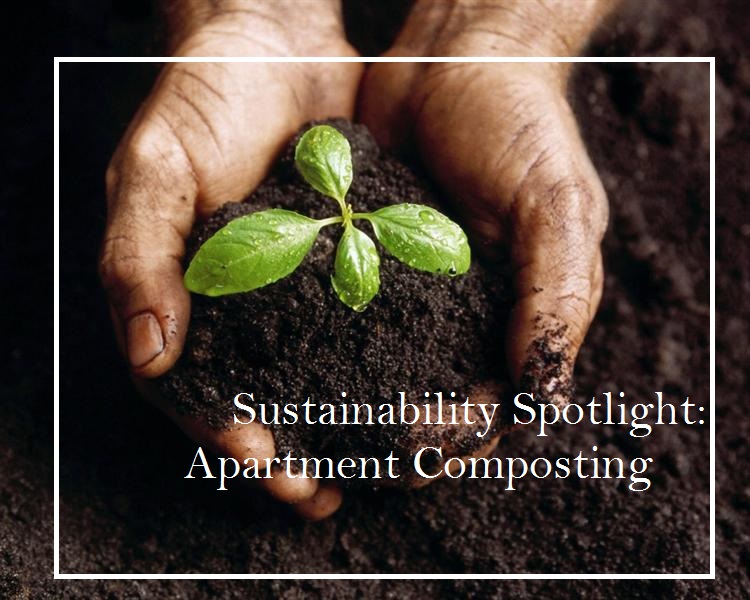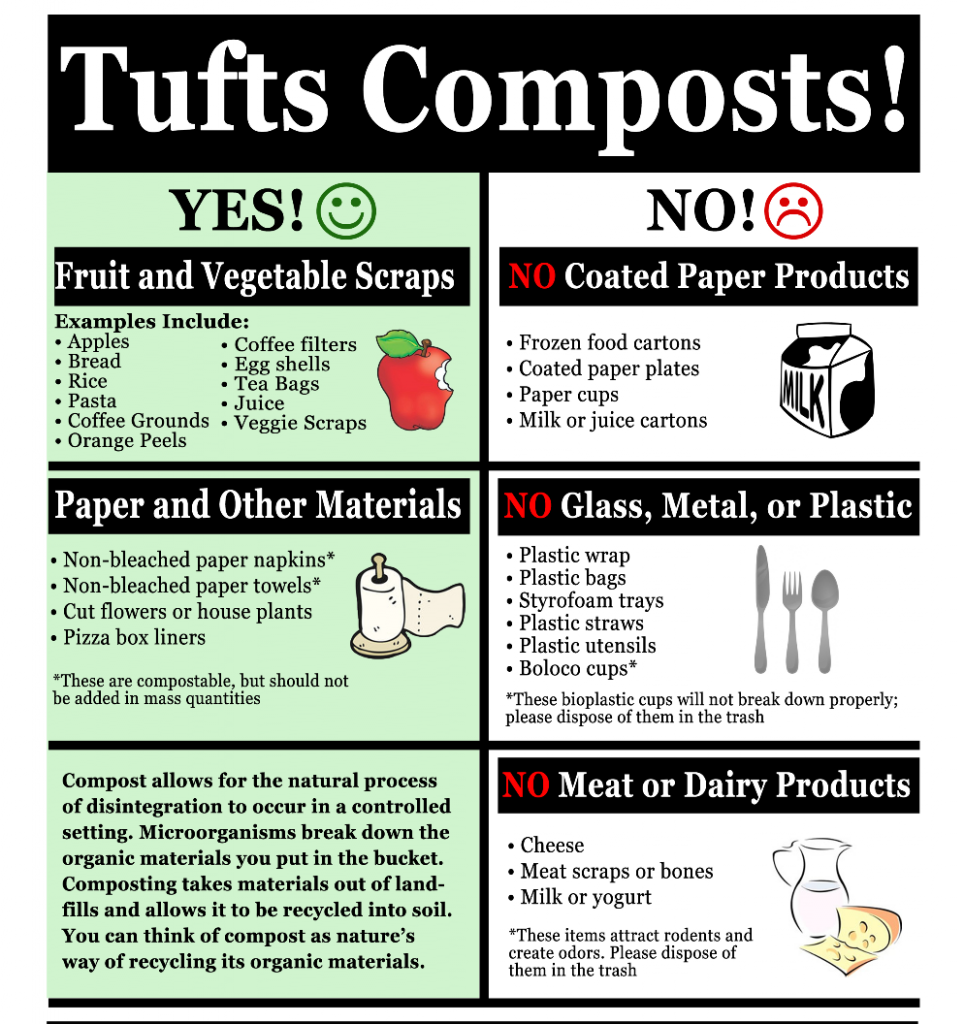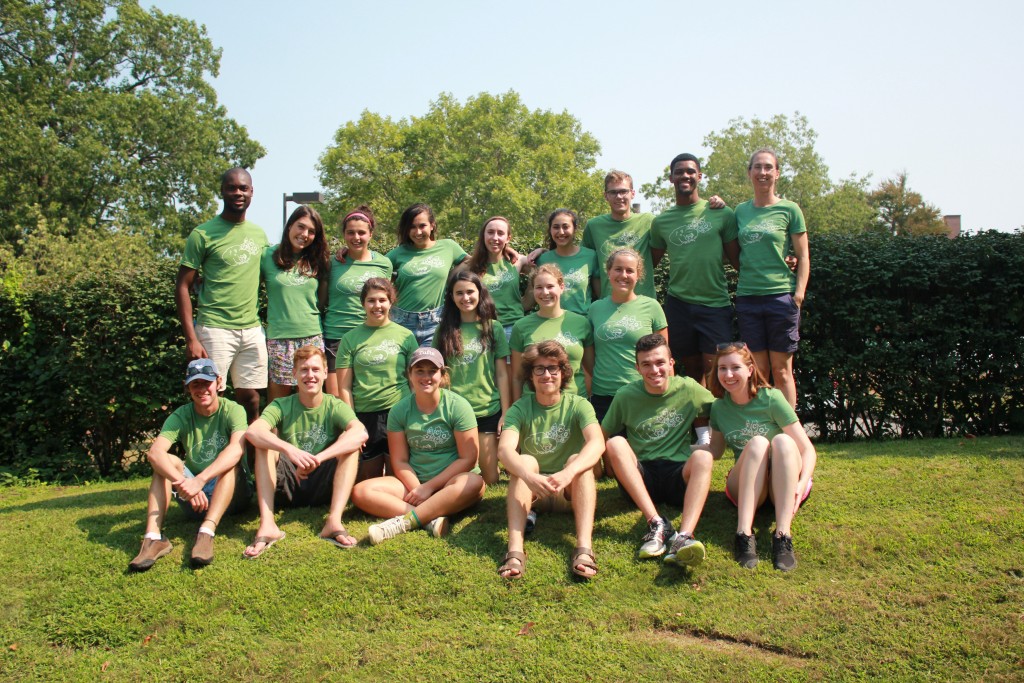
Growing up, my family always had a little white bucket with a green lid next to our sink. While cooking, we’d fill it with fruit peels, coffee grounds, the rough ends of root vegetables: basically anything our chickens wouldn’t eat. Once the bucket filled up, someone (usually my dad) would dump the contents onto a large pile in our backyard. And just like that, we composted!
Okay, it’s a little more complicated than that, as I learned over time – composting also requires attention to temperature, contaminants, and other environmental factors – but composting was an entirely normal part of our kitchen system. Tufts’ new apartment composting program operates a lot like that: it’s an easy introduction into the practice of composting, with institutional support to make sure you know what you’re doing (and someone else takes care of the complicated parts!).
The program provides apartments with a compost bin, instructions, odor-reducing materials, and ongoing support. And it’s really that simple!
Here are a few things I’ve learned so far:
1. Location, Location, Location
Placement matters! In my parents’ kitchen, the compost bin sits right next to the sink, which made it just as easy to throw something into the compost as into the trash. In our dorm, there’s no ideal location, so the compost bin sits on the wide sill of the kitchen window. The trash is closer to our cooking space and much more visible, which was initially an obstacle to adjusting our behaviors.
TIP: If you can’t relocate your compost bin, play around with others to make it more convenient and visible. My suitemate requested a sign explaining what could and could not be composted, and I hung it next to the stove so anyone cooking or reaching into the cabinet would be reminded. The positive association with Zac Efron might help, too.

2. Composting is Contagious
For a few weeks, I was the only one using the bin, but my suitemates have really gotten on board. And not only are they composting, but they ask me clarifying questions and once even moved some food scraps out of the trash and into the compost bin! I haven’t figured out whether they are merely following my lead because my behavior has normalized composting or whether they’re afraid of my judgment if they don’t compost….
TIP: Be a composting trendsetter! There are a lot of reasons why people don’t compost, whether out of habit or from lack of knowledge. Like most behavior changes, though, reinforcing the ease and benefits of a behavior is a lot more effective than trying to make people feel bad for their current habits.

Kate, CJ, and Savannah from TuftsRecycles! are excited to have so many students composting!
3. Don’t Procrastinate
Emptying our compost bin remains our only challenge. I’m typically the one taking it out, so I’ll put it off because I have to take the container out and bring it back in and therefore can’t do it on the way to class… It’s really not a hardship at all, but it requires a little forethought and I tend to put off emptying the bin. Our bin fills up pretty quickly and during the warmer months, we’ve dealt with odors and fruit flies. Luckily, TuftsRecycles! sends out weekly reminders.
TIP: Try to set a regular date and time to take out your compost. You could even set a reminder on your phone or calendar. Emptying your compost early and often will reduce smells and prevent messes! There are drop-off locations all across campus.
4. It’s Not Just Food Scraps
Many compost programs accept items like non-plastic utensils and packing materials when made out of organic, readily decomposable materials. Once you start composting, you start noticing items in your life which you could replace with compostable items. For instance, our suite uses bleached paper towels, but if we switched to non-bleached – the brown kind Tufts uses in bathrooms across campus – we could compost those as well. The long-term best option would be to move away from paper towels altogether, but it would be a start!
TIP: When in doubt, this handy guide will help you sort it out. Municipal or private composting guidelines in greater Boston might be different from places where you have composted in the past.

Your Turn: Get Composting!
- Request a bin for your dorm or on-campus apartment.
- You can always just use a bucket or bin of your own, preferably one with a lid and some ventilation.
- The Tufts Bookstore now stocks compost bags to line your bin.
- No matter where you live or whether you are part of the program, you can dump your compost at central compost locations on campus.

- Live off-campus or not at Tufts? Look into composting in your backyard or participating in a municipal composting program. Medford and Somerville offer compost bins and can help connect you with a compost collector.
You’d be surprised how much of your kitchen waste you can divert from a landfill through this one simple change.







Find Us On Social Media!